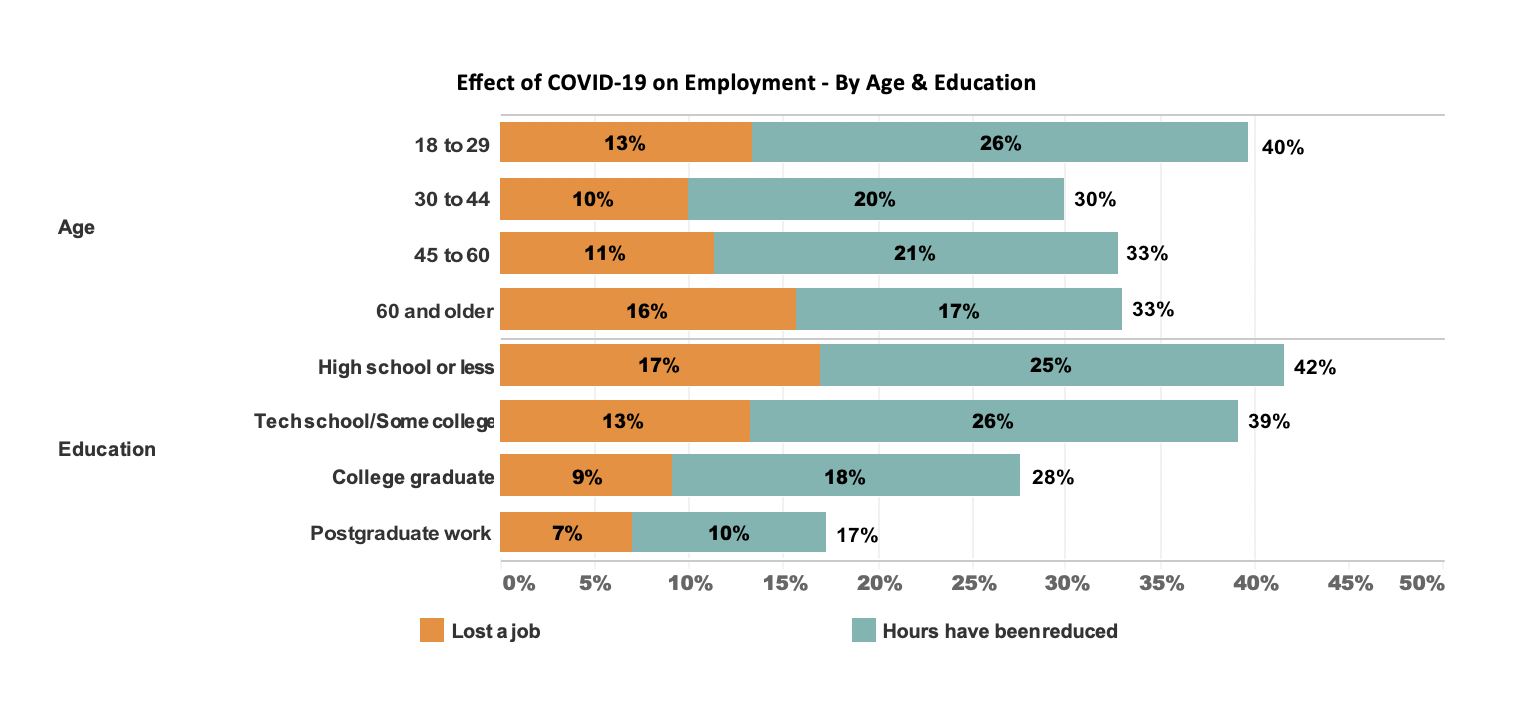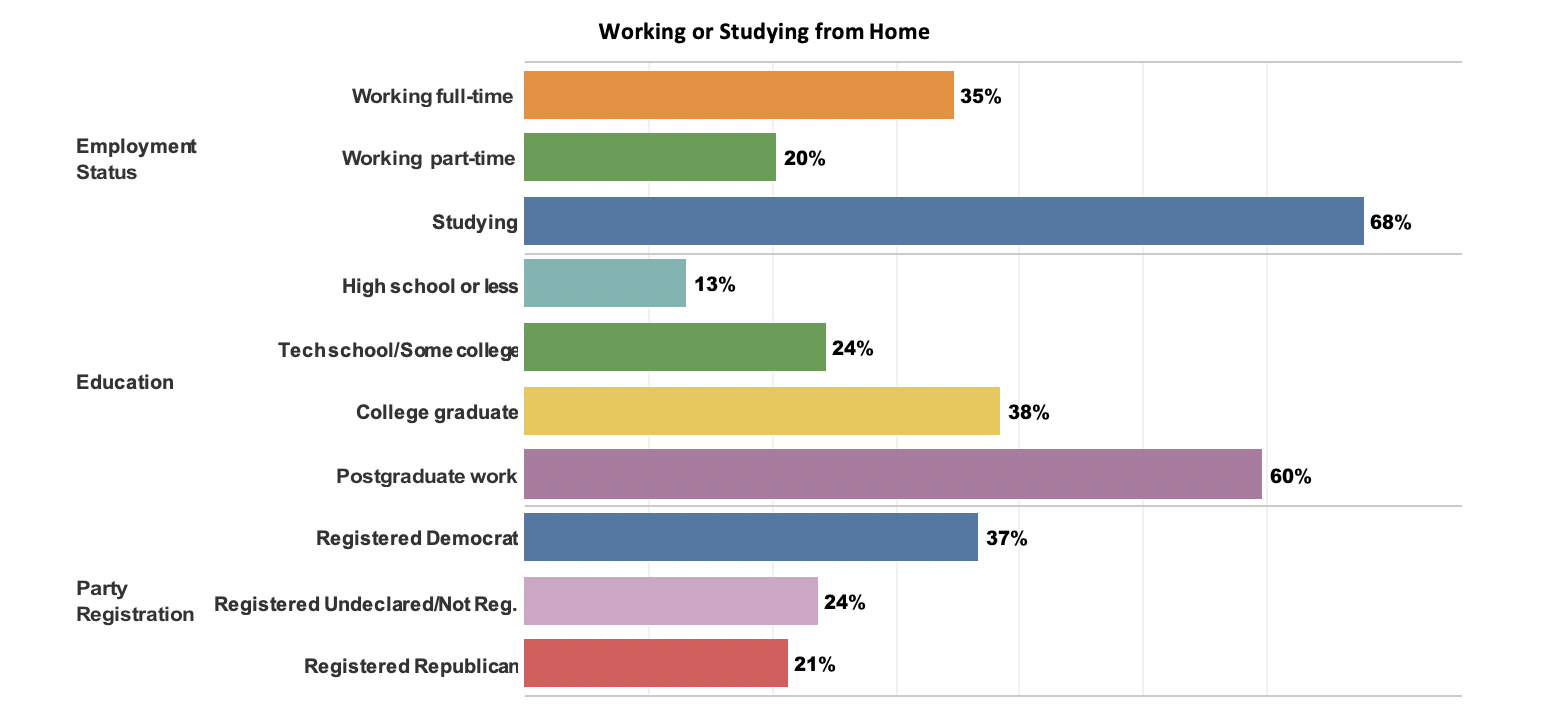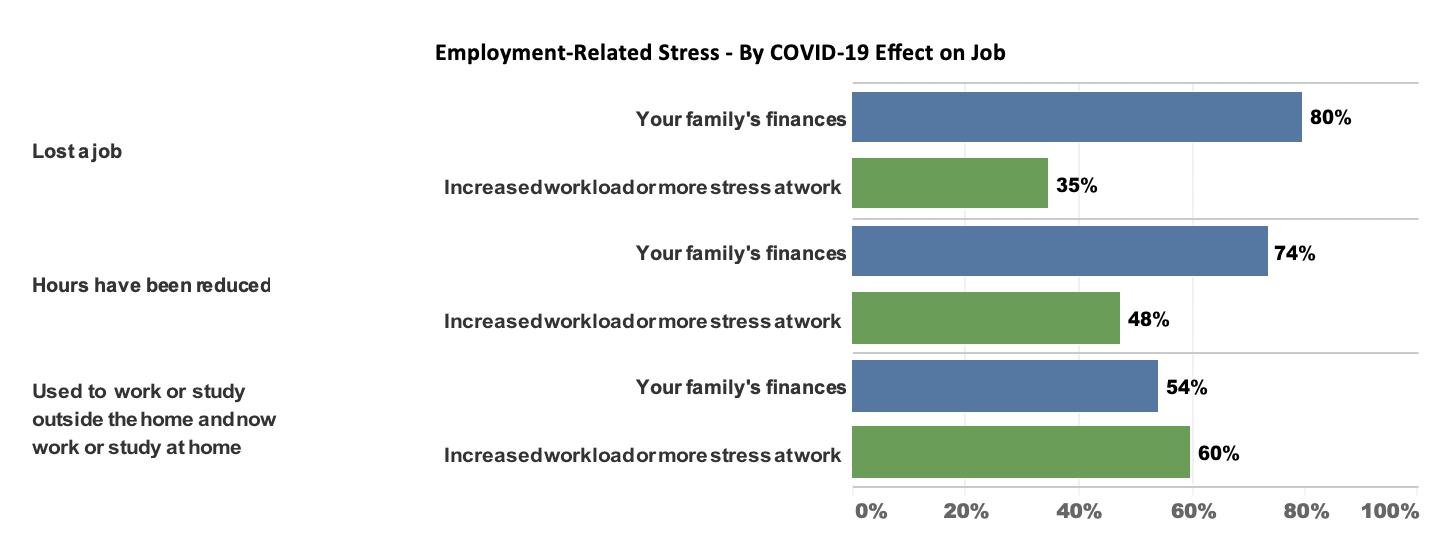LARGE NUMBERS OF NH WORKERS AFFECTED BY COVID-19; MOST PRIORITIZE SOCIAL DISTANCING OVER RESTARTING ECONOMY
Prepared by:
University of New Hampshire Sean P. McKinley, M.A., Tracy E. Keirns, Ph.D., Zachary S. Azem, M.A., & Andrew E. Smith, Ph.D.
Dartmouth College Judy Rees, B.M., B.Ch, M.P.H., Ph.D., Leila Mott, M.S., Margaret Karagas, Ph.D., Brenda Sirovich, M.D., M.S., & Anne Hoen, Ph.D.
DURHAM, NH - One-third of working Granite Staters say they have lost a job or had their work hours reduced as a result of the COVID-19 pandemic. However, more than half of New Hampshire households still have at least one member who left home for work in the preceding seven days. Despite these economic hardships, when asked to choose between restarting the economy and maintaining social distancing, a large majority of New Hampshire residents prioritize social distancing, even those who have lost a job or work hours. Young people and those with a high school education or less are more likely to have lost a job or work hours and express high levels of financial stress. Older and more educated people are less stressed, less likely to have lost a job or work hours, and are more likely to be working remotely.
These findings are based on the Dartmouth College-UNH Survey Center New Hampshire COVID-19 Study*, conducted by the University of New Hampshire Survey Center in collaboration with the Department of Epidemiology at the Geisel School of Medicine at Dartmouth. One thousand and twenty-nine (1,029) Granite State Panel members completed an initial survey online between April 3 and April 5, 2020. Data were weighted by respondent sex, age, education, and region of the state to targets from the most recent American Community Survey (ACS) conducted by the U.S. Census Bureau, as well as party registration levels provided by the New Hampshire Secretary of State. The Granite State Panel is part of an effort by the University of New Hampshire Survey Center to investigate new ways of gathering and understanding the opinion of New Hampshire residents. Granite State Panel members are recruited from randomly-selected landline and cell phone numbers across New Hampshire and surveys are sent periodically to panel members.
Effect of COVID-19 on Employment
Two-thirds of New Hampshire residents in the workforce say that their job has been affected by the COVID-19 pandemic. One-third (33%) of these Granite Staters say they have lost a job (12%) or that their hours have been reduced (21%). Half (50%) of working households in the state have at least one member who has lost a job or had their hours reduced.
Three in ten (30%) working Granite Staters are now working or studying from home due to the COVID-19 pandemic, while 8% say that their hours have increased because of the crisis. Nearly four in ten (39%) households have at least one member who is now working or studying from home, while 12% of households have a member whose hours have increased.
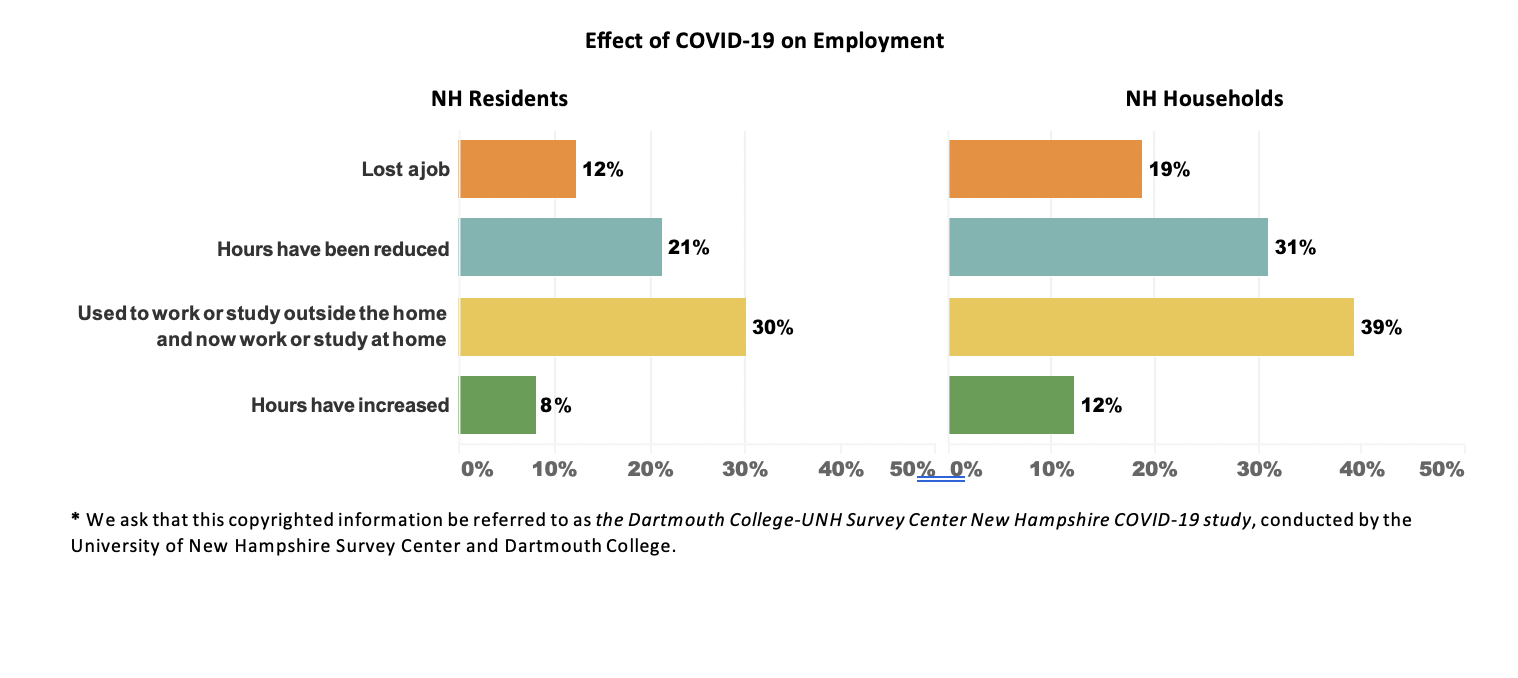
Among Granite Staters in the workforce, young people in the state have been hit particularly hard by the COVID-19 pandemic; 40% of those under thirty years old report that they have lost a job or had their hours reduced because of the outbreak.
The situation has also affected Granite Staters quite differently based on education. About four in ten working New Hampshire residents without a high school or college degree say they have lost a job or had their hours reduced, but only 28% of college graduates and 17% of those who have completed postgraduate work say the same.
As widespread social distancing continues in the state, large numbers of New Hampshire's workers and students are now working or studying from home. Thirty-five percent of those who are working full-time and 20% of those working part-time are currently working from home, while more than two-thirds (68%) of students are now studying from home.
Only 13% of those with a high school education or less are working or studying at home, while a quarter (24%) of those who went to technical school or have some college education and three in eight college graduates (38%) are doing so. By contrast, a majority of New Hampshire workers and students who have completed postgraduate work (60%) say they are currently working or studying at home. Registered Democrats (37%) are more likely to say they are working from home than registered Republicans (24%) or those who are undeclared or not registered to vote (21%).
Leaving Home for Work
Despite large numbers of Granite Staters working from home or having lost their job or work hours, more than half of New Hampshire households had someone in the previous seven days leave the house on at least one day to go to work. Twelve percent of respondents say that someone left the house for work on six or seven of the previous seven days, while one-quarter (26%) say someone left to go to work on five of the previous seven days. One in five (20%) say someone in their household left for work between one and four days out of the previous seven, while 42% say that no one in their household left to go to work in the previous seven days.
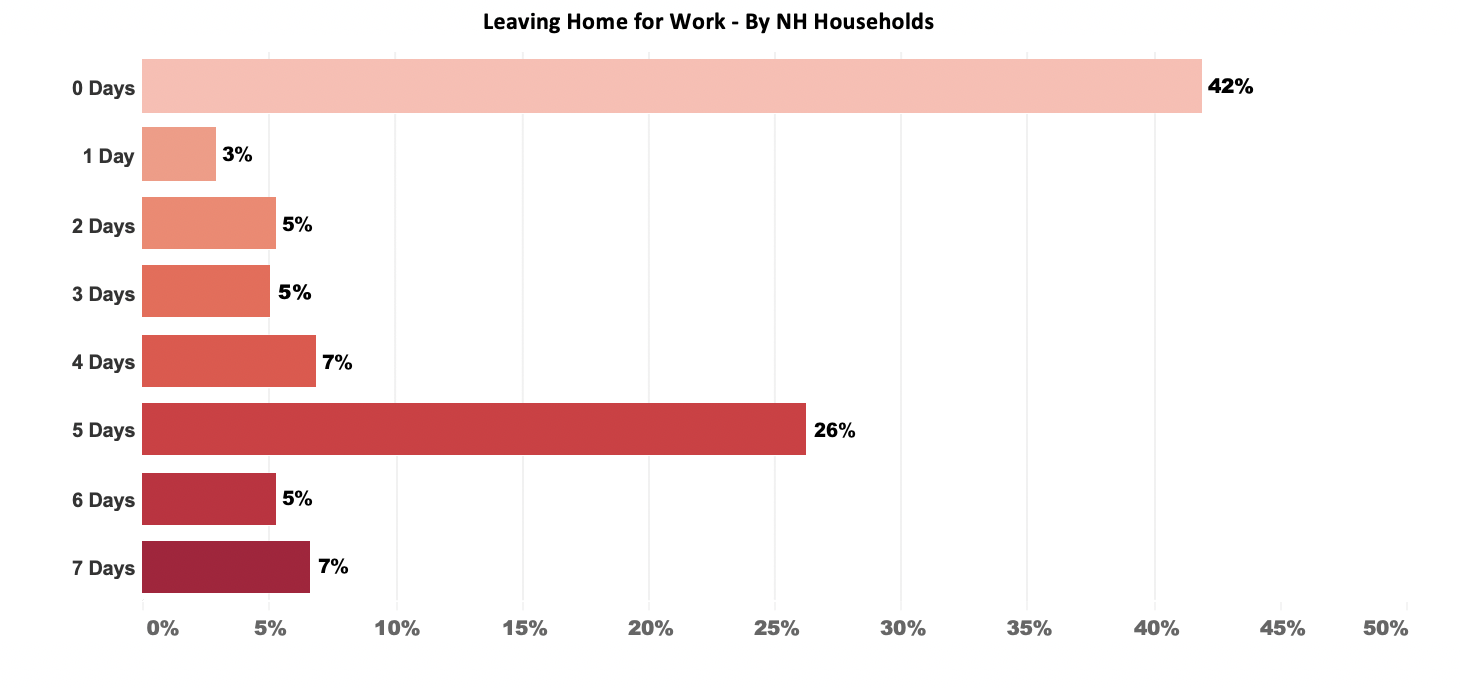
Employment and Financial Related Stress
Unsurprisingly given the large amount of people whose job has been affected by the COVID-19 pandemic, a considerable number of Granite Staters report feeling stress related to their financial situation and employment. Fifty-six percent of Granite Staters say they are extremely (17%) or somewhat (39%) stressed about their family's finances, 52% are extremely or somewhat stressed about the loss or potential loss of their job or reduced hours or income, and 50% are stressed about an increased workload or more stress at work.
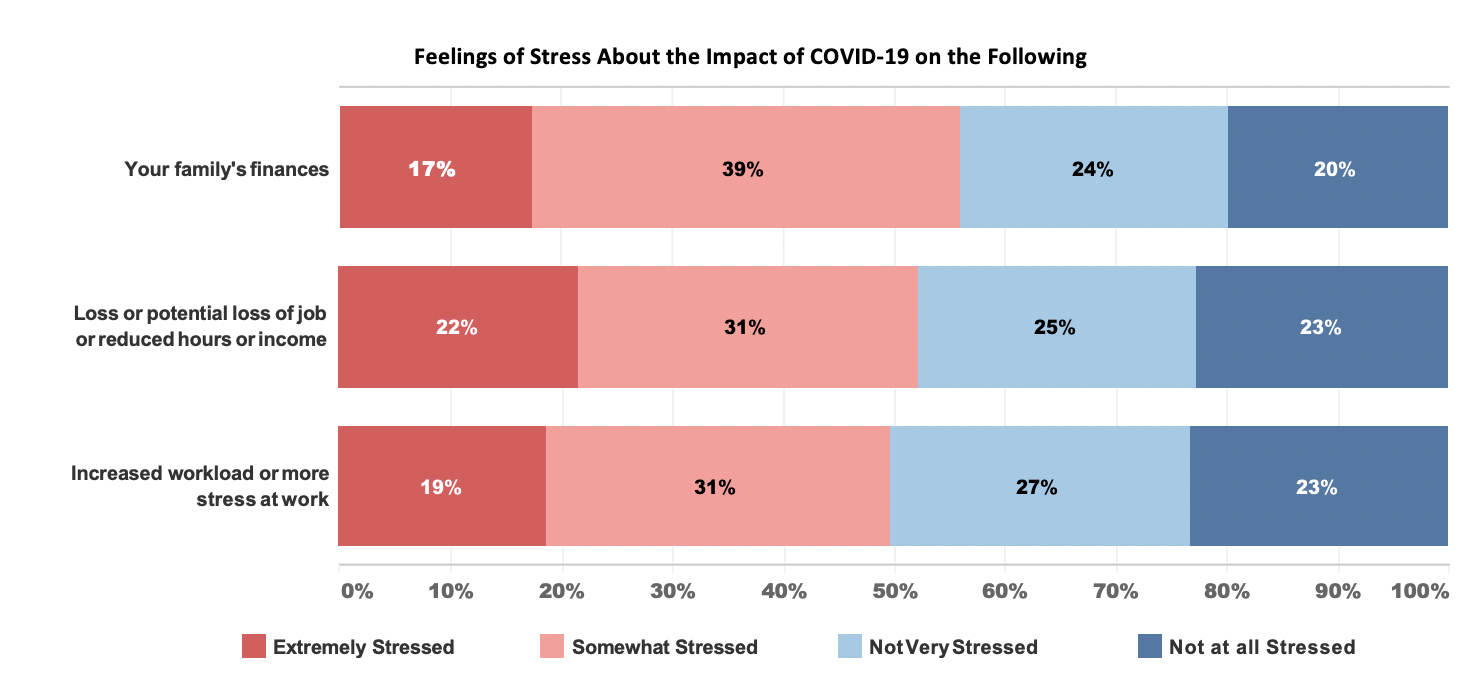
Among those who have lost a job, four in five (80%) say they are extremely or somewhat stressed about their family's finances while three-quarters (74%) of those whose hours have been reduced feel the same way. Just over half (54%) of those who are working or studying at home are extremely or very stressed about their family's finances, but six in ten (60%) are stressed about an increased workload or more stress at work.
Respondents under forty-five years old report higher stress than older people regarding their family's finances as well as an increased workload or more stress at work. Those with lower levels of education are more likely than those with high levels of education to be stressed about their family's finances, while those with higher levels of education are more likely to be stressed about an increased workload or more stress at work.
Relative Importance of Restarting the Economy & Maintaining Social Distancing Practices
Respondents were also asked whether they think restarting the economy or maintaining social distancing practices is more important when considering how long states should ask or require people to stay home. More than two-thirds (68%) consider maintaining social distancing practices to be more important, with 43% being as emphatic as possible in their opinion. Nineteen percent say restarting the economy and maintaining social distancing practices are equally important, while only 13% favor restarting the economy.
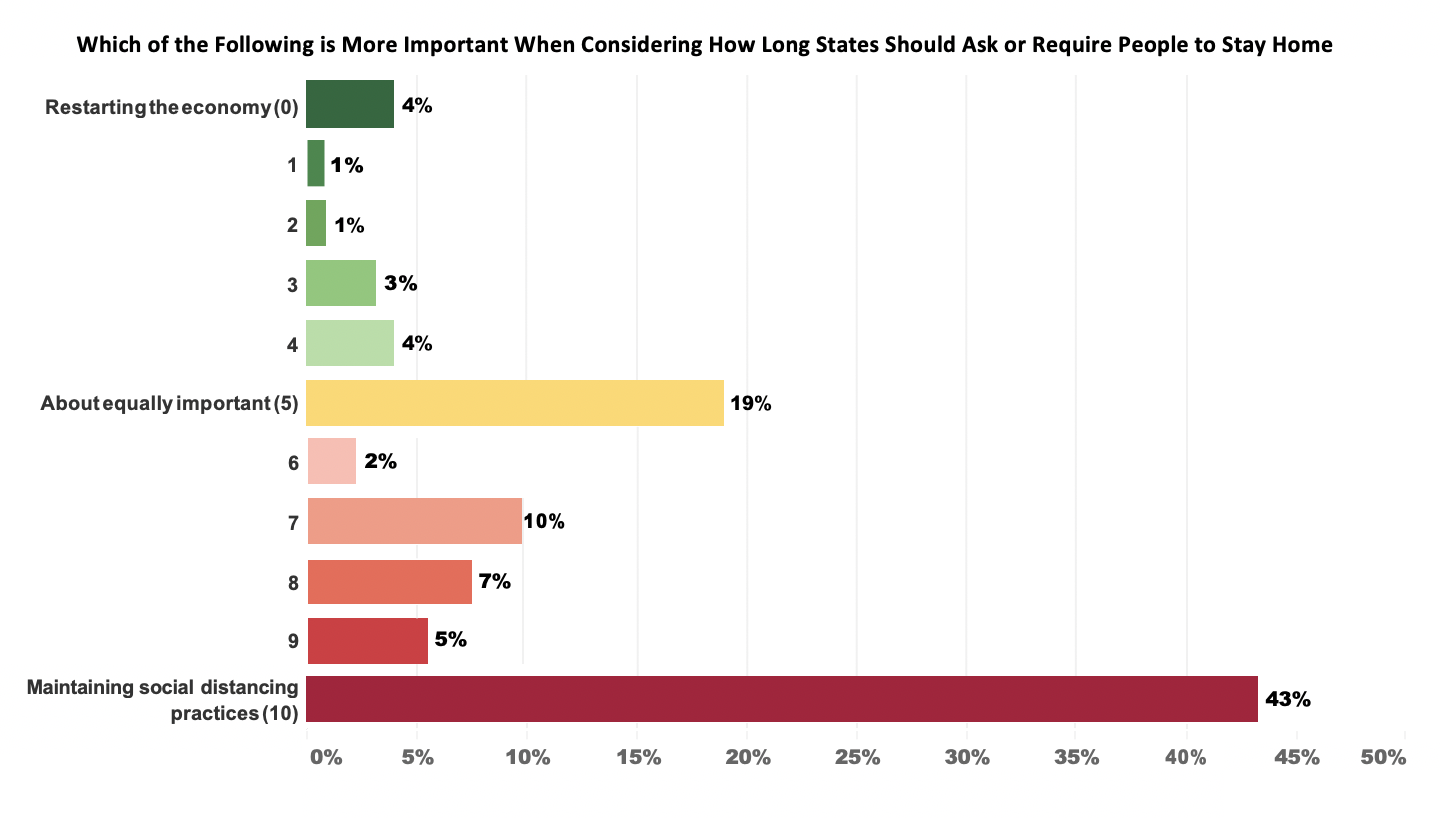
Despite being perhaps the group most severely affected economically as a result of the COVID-19 pandemic, nearly three-quarters (72%) of NH residents who have lost a job prioritize maintaining social distancing practices over restarting the economy. In fact, those reporting the greatest stress over their family's finances show the strongest support for social distancing.
Those who are currently working or studying at home agree, as 79% prioritize social distancing and only 5% prioritize restarting the economy. Those whose hours have been reduced show more urgency towards restarting the economy - 27% prioritize it over maintaining social distancing practices - but even a majority of this group believe social distancing is more important.

Disagreements on the importance of restarting the economy and maintaining social distancing can also be seen among several demographics. Older people (60 and older) are most likely to prioritize maintaining social distancing, while those aged 30 to 44 are most likely to prioritize restarting the economy. In addition, women overall are more likely than men to prioritize maintaining social distancing.
As with previous results, there are also clear differences based on education. Respondents who have earned a college degree, who are more likely to be working from home and are less likely to have had their job be negatively affected, place greater emphasis on social distancing, while those without a college degree place slightly more emphasis on restarting the economy. A striking difference can be seen by political affiliation, with more than nine in ten (91%) registered Democrats prioritizing maintaining social distancing over restarting the economy, compared with only 41% of registered Republicans.
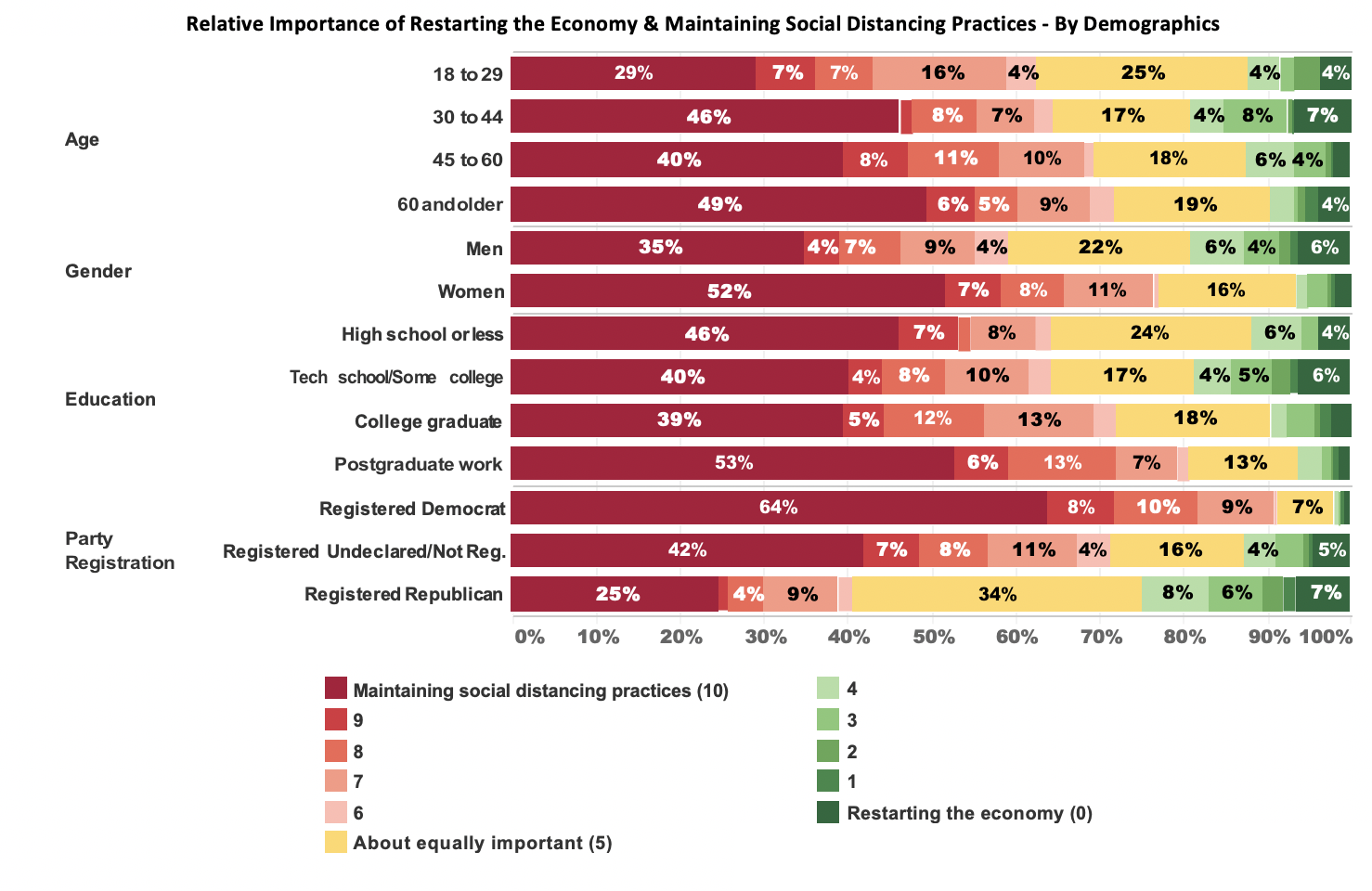 Dartmouth College-UNH Survey Center New Hampshire COVID-19 Study Methodology
Dartmouth College-UNH Survey Center New Hampshire COVID-19 Study Methodology
These findings are based on the Dartmouth College-UNH Survey Center New Hampshire COVID-19 Study, conducted by the University of New Hampshire Survey Center in collaboration with the Department of Epidemiology at the Geisel School of Medicine at Dartmouth. One thousand and twenty-nine (1,029) Granite State Panel members completed an initial survey online between April 3 and April 5, 2020. Data were weighted by respondent sex, age, education, and region of the state to targets from the most recent American Community Survey (ACS) conducted by the U.S. Census Bureau, as well as party registration levels provided by the New Hampshire Secretary of State. The Granite State Panel is part of an effort by the University of New Hampshire Survey Center to investigate new ways of gathering and understanding the opinion of New Hampshire residents.
Granite State Panel members are recruited from randomly-selected landline and cell phone numbers across New Hampshire. Respondents to the Granite State Poll were asked if they wished to participate in further research and asked to provide an email address. Those who agreed and provided an email address were added to the panel. Panel members were also recruited by texting a random sample of cellular telephones in the state and inviting the recipient to take a short survey.
For each survey which they complete, panel members are entered into quarterly drawings to earn rewards, such as gift certificates from statewide and internet companies. Due to rounding, percentages may not sum to 100%.
For more information about the Dartmouth College-UNH Survey Center New Hampshire COVID-19 study, please visit:
https://cola.unh.edu/unh-survey-center/projects/dartmouthunh-covid-19-survey
For more information about the Granite State Panel, please contact Dr. Andrew Smith at (603) 862-2226 or by email at andrew.smith@unh.edu or visit:
https://cola.unh.edu/unh-survey-center/projects/granite-state-panel
This project is supported by emergency funding from The Hitchcock Foundation, the Jack and Dorothy Byrne Foundation, Dartmouth College COVID-19 "Spark" funding, and in-kind support by UNH Survey Center staff.
